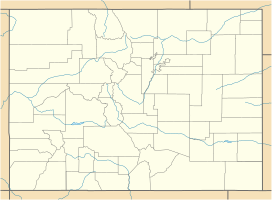Rollins Pass
| Rollins Pass | |
|---|---|

Riflesight Notch railroad trestle on the way up Rollins Pass in 1903.
|
|
| Elevation | 11,660 ft (3,554 m) |
| Traversed by | Unpaved road, natural gas pipeline |
| Location | Boulder, Gilpin, Grand counties, Colorado, U.S. |
| Range | Front Range |
| Coordinates | 39°56′03″N 105°40′58″W / 39.93417°N 105.68278°WCoordinates: 39°56′03″N 105°40′58″W / 39.93417°N 105.68278°W |
| Topo map | USGS East Portal |
|
Colorado
|
|
|
Rollinsville and Middle Park Wagon Road / Denver, Northwestern and Pacific Railway Hill Route Historic District
|
|
| Area | 436.3 acres (176.6 ha) |
| Built | 1903 |
| Built by | Denver, Northwestern and Pacific R.R. |
| NRHP Reference # | 80000881, 97001114 |
| Added to NRHP | September 30, 1980 |
Rollins Pass, elevation 11,660 ft (3,550 m), is a mountain pass in the Rocky Mountains of north-central Colorado in the United States. The pass is located on and traverses the continental divide at the crest of the Front Range southwest of Boulder, and is at the boundaries of Grand, Gilpin, and Boulder counties. The pass provides a route over the Continental Divide between the Atlantic Ocean watershed of South Boulder Creek (in the basin of the South Platte River) with the Pacific Ocean watershed of the Fraser River, a tributary of the Colorado River.
Rollins Pass was added to the National Register of Historic Places in 1997.
Rollins Pass (also known as Corona Pass) sits approximately five miles east and opposite the popular ski area in Winter Park, and is in the general location between Winter Park and Rollinsville. The Boulder Wagon Road (BWR), which predates the rail route, employed much of what would later become Rollins Pass. The pass is traversed by two unpaved roads, mostly the former roadbed of the Denver, Northwestern, and Pacific Railway, that later became the Denver and Salt Lake Railway. This high altitude or 'hill route' railroad was known as the Moffat Road and this route was replaced (and subsequently abandoned) by the opening of the Moffat Tunnel in 1928; subsequent to the opening of the new route, the rails and ties were removed in 1935.
...
Wikipedia

